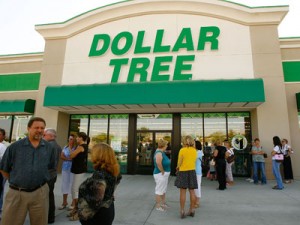 Dollar stores have traditionally disappeared into the shadows of the retail industry, often being overlooked as giants such as Wal-Mart dominated majority of small-item consumer sales. However, the past few months have proved the resilience of the local dollar store. Smaller chains such as Dollarama and DollarTree have seen a boom in sales as consumers are opting to save on any expense possible.
Dollar stores have traditionally disappeared into the shadows of the retail industry, often being overlooked as giants such as Wal-Mart dominated majority of small-item consumer sales. However, the past few months have proved the resilience of the local dollar store. Smaller chains such as Dollarama and DollarTree have seen a boom in sales as consumers are opting to save on any expense possible.
The recent trend in consumer spending has sparked new strategies from other giants. Wal-Mart and Canadian Tire have recently ramped up promotion of “dollar deal” merchandise, and have begun stocking much more 1$, 2$, and 3$ items.
But what does this mean for consumers? I believe that the gradual shift towards more practical, lower priced merchandise is an indication of a slowly stabilizing economy. Although it would appear the consumer spending has decreased, people are simply trying to maximize their utility with what they have at this time. A move towards cheaper merchandise indicates a step away from the need to take on credit, which in turn should lower the average consumer debt load.
Ultimately, the dollar store has made a strong comeback which not only boosts the economy, but also promotes the longer term stability which is much needed during these times.


